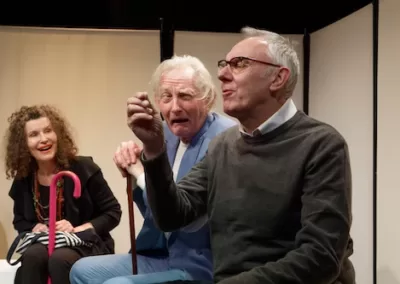
This talk was prepared for Bromley U3A Theatre Group and shared with them at Bromley Little Theatre on 09 November 2023
What exactly do we mean by musical theatre? It is really a separate genre from other forms of theatre or have the boundaries now become so blurred that the distinctions are meaningless?
When most of us here were growing up, musical theatre meant Rogers and Hammerstein (or Rogers and Hart) or George Gershwin and we all knew were we were. In general it was relatively plausible, often hard hitting stories, Carousel 1945, for instance, deals with domestic violence in a tight New England community and The Sound of Music 1959 is about, among other things, resisting the Nazis in Austria while South Pacific 1949 explores race relations. We love and remember them for the glorious songs and tunes which have made them perennially popular but they’re none of them exactly light entertainment when you think about the subject matter.
At the same time of course, London theatre audiences were rejoicing in the much lighter but equally tuneful work of Sandy Wilson’s The Boyfriend (1953) and Julian Slade’s Salad Days (1954). I was too young to see either then but I remember my parents seeing and loving Salad Days. My dad then bought a ten-inch LP of the music to play on his newly acquired, beloved radiogram (remember those?). Our house resounded with it for weeks with the result that, young as I was, I soon knew all the songs.
All these shows consist of dialogue interspersed with songs to reinforce the mood, emotion, joke or simply to create a bit of all singing/all dancing theatrical spectacle. So is that what we mean my musical theatre? Well, it might have been then, but I don’t think it is now.
I think that musical theatre has actually become a huge all-encompassing term. Jesus Christ Superstar (1972), for example, was originally described as a Rock Opera. And it certainly includes opera conventions – it’s “sung though” for example. There is no spoken dialogue. At its best (and in that fabulous original production which I think I saw 3 times) it needs a big orchestra with most of the instruments you find in a symphony orchestra along side those extraordinary electric guitars. So is it an opera or is it musical theatre?
Remember too that “grand” opera isn’t necessarily sung-through. The Magic Flute has a lot of spoken dialogue – originally in German, not Italian. So are the operas of Offenbach and Gilbert and Sullivan – please don’t let’s patronisingly call them “operettas”. So, the distinctions are pretty blurred.
Stephen Sondheim who died two years ago in 2021 changed the direction of musical theatre, of course.
His work relies on harmony, nuance, repetition and words rather than melody and, as we all know it can be immensely powerful. Think of Judi Dench singing Send in the Clowns from A Little Light Music. Or hilarious – think of Angela Lansbury (or one of the many who’ve done it since) singing The Worst Pies in London from Sweeney Todd.
In general, most of the new musicals I see these days are in this style – a lot more Sondheim than Rogers and Hammerstein. You might come out moved and impressed but you won’t be humming.
I would argue that musical theatre is any kind of theatre which uses some music for any purpose. Opera, therefore, becomes a subdivision of it along with, for instance, pantomime, “straight” plays which feature a few songs and much more. And just to complicate things still more we have musicals like Miss Saigon (1989) which is based on Puccini’s Madame Butterfly (1904) and no one would argue that Madame Butterfly isn’t an opera.
Of course there are different sorts of musical theatre. In recent years we’ve got very used to the “juke box musical” in which songs are picked – often they’re by a particular group or band – and then a story contrived around it. Mama Mia, is of course, one of the most successful examples of that. The story about Donna’s three ex-lovers actually works quite convincingly as the ABBA songs keep on coming. The juke box thing can work. Our House, which features Madness songs is quite a good show too.
On the other hand, the results can be pretty dire. I recently had the good fortune (or something) to see Twiggy: the Musical at Menier Chocolate Factory. Now I have a lot of respect for Twiggy who clawed herself out of a “working class” background to become a world-famous model, then actor and generally good guy. As a character in this show commented “And she even saved Marks and Spencer”. Yes it’s a rags to riches story but that’s not enough to make a good musical especially if you try to bulk it out with things like Bernard Cribbin’s “Right Said Fred” – well done but almost unbelievably incongruous like most of the songs which were clumsily bolted in. I was sitting next to a youngish barrister and his wife. When he realised what I was doing (the notebook and pen is a giveaway) he asked me what I thought of the show. It’s a “so what?” show I told him. Yes, it’s an inconsequential story and I had to give it just 2 stars.
I saw a similar one at Stratford East a few years ago about Dusty Springfield. Yes, there’s more to her life than to Twiggy’s – more ups and downs – but it failed for me because although we got a lot of her songs the actress playing her didn’t sing them as well as Dusty Springfield did.
And what about the relationship between musical theatre and film? Back in the day, the stage show came first and if it was successful a film might be made. West Side Story, for instance landed in Washington, Philadelphia and on Broadway in 1957 – reaching London the following year. The film that we all know, and love was released in 1961 – followed 60 years later by a new Spielberg version on 1921. But it began life on stage.
Or take The Sound of Music which opened on Broadway in 1959 and arrived in London in 1961. The film – which holds records for being the most watched film of all time – came four years later in 1965. Again it began life with its feet firmly on the stage.
Or course there have been other stage to screen examples since but the trend now seems to be firmly the other way round possibly because of the failures. Cats, for instance, which dates from 1981, is a wonderfully powerful show with a score to die for but the 2019 film flopped dismally.
I often review productions of – to cite just a handful of examples Shrek, Little Shop of Horrors, 9 to 5, Priscilla Queen of the Desert and The Producers – all based on films. And I think it’s because the people who invest money in these projects think, probably rightly, that if film has been successful people will recognise the name and are therefore more likely to buy tickets for a new show if it sounds familiar.
But we regular theatre goers know that it doesn’t always work. I thought the 2005 Kinky Boots film starring Chiwetel Ejiofor was excellent. Moving, thoughtful, quirky, very human and what an actor! But why, if it transfers to stage, does it have to be a musical? Don’t we value “straight” plays any more? I’ve seen Kinky Boots: the musical several times and I honestly don’t think the music adds anything. I feel the same about Calendar Girls and Tim Firth’s musical. It was a fine film – and of course, a wonderful true story. It doesn’t need music to enhance it. Such music is usually pretty unmemorable anyway. If you’ve seen Kinky Boots or Calendar Girls I defy you to sing me a single number from either. But I bet you could sing me lots of things from Jesus Christ Superstar, South Pacific, HMS Pinafore or Mary Poppins.
Another whole tranche of musical theatre shows are based on books without having to be films first and they are, of course, some of the most successful musicals ever.
Take Oliver! the 1960 musical which is VERY loosely based on Charles Dickens’ s 1937 novel. Yes, it’s a very good show and I bet everyone of us in this room could sing every number, but I was an English teacher long before I became a journalist and theatre critic and I have to point out that the musical uses only half the novel and completely sanitises the character of Fagin – it used to make an interesting discussion point with my students. We’d read the novel, watch the 1966 film of the musical, and discuss the differences. Dickens repeatedly calls Fagin “the merry old gentleman” because we are seeing him through Oliver’s very naïve eyes. In fact, Fagin is a ruthless villain who will stop at nothing, absolutely nothing, for his own advantage. And the 21st century reader – given that the slimy old man is cooped up with all those boys, will probably detect a whiff of paedophilia too. At the end he goes to the gallows and good riddance. I honestly think that Lionel Bart and co misread the novel, didn’t understand the Dickensian irony and mistook Fagin for “a merry old gentleman”. Witness the way he dances away singing, scot-free at the end of the musical. Brilliantly clever though to build his famous song “I’m reviewing the situation” around accelerating Jewish klezmer rhythms. It’s the sort of thing good musical theatre can do magnificently.
I digress – although Les Miserables (1980), let it be noted, is similarly very selective with Victor Hugo’s 1862 novel. There are, of course, some book musicals which stick fairly closely to the source material, present some quite tuneful music, and draw audiences consistently. Why else has Matilda the Musical proved so enduringly successful? Like Les Miserables, it was originally an RSC show. It opened in Stratford in 2010 as their Christmas or family show for that year. I remember Charles Spencer, then Daily Telegraph lead theatre critic writing at the time. “I think the RSC might have a hit on its hands” How right he was. It transferred to the Cambridge Theatre in London and has been running there ever since. Roald Dahl still cuts the mustard especially with Tim Minchin’s music.
Actor musicianship has caught on in a big way in recent years. It’s usually people who can play one or more instruments quite well but who don’t have what it takes to be a full time musician or aren’t quite at virtuoso standard. Instead, they go into acting and the music is a big additional selling point when they go for jobs – you could almost say “a second string to the bow” (sorry – I couldn’t resist that.)
Known colloquially in the theatre world as “actor-musos” these people are very employable. I’ve seen whole musicals in which all the music is played on stage by the cast who become a band when they need to and provide sound effects on their instruments. Equally it can be a more or less “straight” play like The Beekeeper of Aleppo which I saw at Nottingham Playhouse earlier this year with some occasional music. Many children’s shows are done with a cast of actor musos – I have fond memories of Hetty Feather, for example which is based on a Jaqueline Wilson novel. And what multitasking skill actor-musicianship takes. Not only do you have to play a character convincingly, but you also have to manage your cello or trumpet, having not just learned your lines but also the music because music stands don’t fit the action. Typically, these talented people play several instruments and will even learn them especially if a job requires it. I once saw at Theatre Royal Margate, a young actor competently playing the accordion on stage in a Christmas show. I knew she was a pianist and clarinettist. When I interviewed her later, I asked her if she’d played the accordion before. “No” she said “But the director wanted it so I just asked him to give me a couple of evenings to sort it out”
Given the popularity of musical theatre in all its forms, it is not surprising that nearly all the major drama schools are offering degree courses in it – from Royal Conservatoire of Scotland and Liverpool Institute of Performing Arts to RADA. There’s even one at Royal Academy of Music. There are musical theatre degrees offered at places such at Trinity Laban in Greenwich and Bird College in Sidcup too. The last decade or so, moreover, has seen the emergence of actor musicianship degrees as well – Guildford School of Acting, Mountview in Peckham and Rose Bruford College, just down the road from here in Sidcup, for example.
Last month a show starring Brian Cox opened at Theatre Royal Bath. It is called Score and it’s about JS Bach. I haven’t seen it but would very much like too so I’m hoping it will transfer – the reviews were encouraging. Given the subject matter it contains a lot of music as another play about Bach – Bach and Sons by Nina Raine with Simon Russell Beale did at the Bridge Theatre a couple of years ago. These are plays about music as is Amadeus (did anyone else see the original cast led by Paul Scofield back in 1979?) and Claire van Kampen’s fine play Farinelli and the King with Mark Rylance in 2015. Plays about music and musicians are at the opposite end of the spectrum from Aida or Guys and Dolls but I still regard it as a form of musical theatre.
So of course, is pantomime – that peculiarly British art form which used to be a new year, January tradition and is now firmly associated with the run up to Christmas. People tell a story with dialogue and punctuate it with song and dance most of which has very little to do with anything but if you’re a panto fan that’s all part of the fun, I have to come clean and admit that it’s not my favourite thing. And I’ve reviewed literally hundreds of them over the years. As a child – I’ve always been a words/story sort of person – I used to wish they’d stop being silly and get on with the story. I was happier then – and in all honesty I still am – if they took me to see a different sort of Christmas show with a proper story. But of course, even if it was The Wind in the Willows or a non-panto account of Peter Pan – there was always music which added a lot of value.
Last year, for example, I saw two musical theatre versions of A Christmas Carol. One was performed in a church in Brighton by the brass players of Brighton Philharmonic and beautifully narrated by Roger Allam. The other was performed by a company called Antic Disposition in Middle Temple Hall. In both cases we got carols and seasonal music woven into the action – and everyone had fun at Mr Fezziwig’s party. And I would suggest that both shows were definitely musical theatre – just a different form of it from Evita or Crazy for You.
In conclusion then, I think Musical Theatre is a very broad church. Drama and music have been connected probably for as long as people have been performing to each other. Often, but not – as I have tried to show – always words and music enhance each other to create something which is bigger and better than both. But we do well to remember that there are many forms of musical theatre and you can’t always force them into watertight categories. Rember this, maybe, the next time someone says to you sniffily: “I don’t like musicals”. Ask them what exactly it is they don’t like!
Photo credit: English National Opera production of Iolanthe.





















